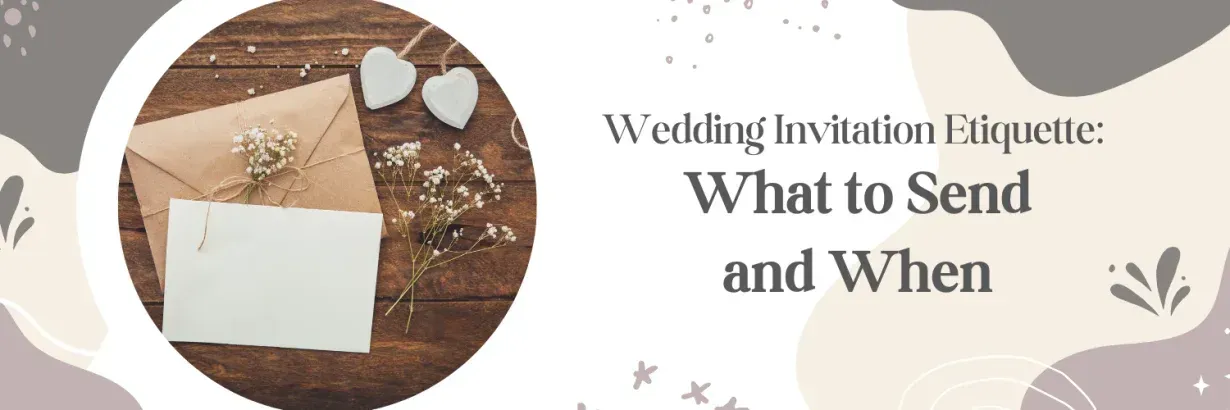
Wedding Invitation Etiquette: What to Send and When
Wedding Invitations

Wedding invitations are more than just cards; they bridge your dreams and reality. They serve as the formal announcement of your upcoming nuptials, and as such, they play a significant role in the wedding planning process. But beyond their practical function, wedding invitations hold an emotional significance. They convey your excitement and anticipation, inviting loved ones to share in your joyous celebration. To ensure your wedding invitations fulfill their roles effectively, it’s essential to understand and adhere to proper wedding invitation etiquette.
Your wedding invitations are the first tangible representation of your love story and the union you’re about to embark on. They are not just pieces of paper; they are heartfelt messages that convey your desire to have your nearest and dearest join you on one of the most important days of your life. The art of sending out wedding invitations goes far beyond mere formality; it’s about setting the stage for the beautiful journey you’re about to embark upon.
Proper wedding invitation etiquette is a testament to your thoughtfulness and attention to detail when done correctly. It reflects your commitment to creating a memorable and harmonious event for all those you hold dear. So, let’s embark on this journey through the world of wedding invitation etiquette, where we’ll explore what to send and when to send it, ensuring that your guests feel invited and genuinely appreciated.
The Purpose of Wedding Invitations

Wedding invitations are not a mere formality but the cornerstone of your wedding planning. Their primary purpose goes beyond the conveyance of dates and locations. Here’s why wedding invitations are so significant:
- Convey Essential Information: At the core, wedding invitations are your messengers, delivering vital details such as the date, time, and location of the ceremony and reception. They serve as a GPS for your guests, guiding them to your celebration.
- Set Expectations: Wedding invitations help set the tone for your event. Whether you’re hosting a grand, formal affair or an intimate, rustic gathering, your invitation gives guests a hint of what to expect.
- Aid Guest Planning: Proper wedding invitations empower your guests to plan their attendance. They provide the information necessary to make travel arrangements, find accommodations, and ensure they can be present on your special day.
- Reflect Your Style: Beyond the practicalities, wedding invitations are a canvas for your creativity. They reflect your wedding’s unique style, theme, and personality, giving guests a preview of the love and joy they’ll experience.
Wedding Invitation Components
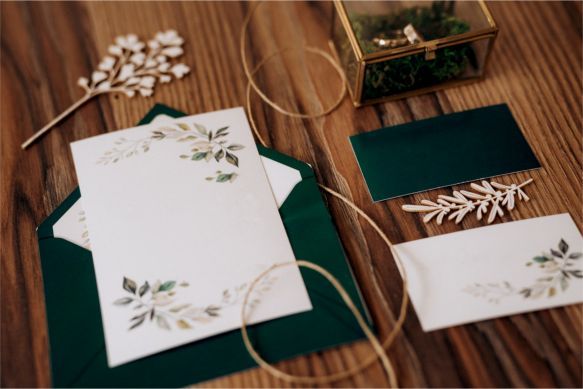
A wedding invitation is a multi-faceted ensemble, each component playing a specific role in conveying information and enhancing the overall experience. Here’s a breakdown of the typical components:
- Invitation: The heart of the ensemble, the invitation itself, carries the core details, such as the names of the couple, the date, time, and location of the ceremony, and often the reception details.
- Envelope: The envelope is not just a vessel for your invitation but also a sneak peek into the elegance and style of your wedding. It protects your invitation and sets the first impression.
- RSVP Cards: These little cards are the key to managing your guest list. They allow guests to confirm their attendance or regretfully decline. They are a vital tool for planning seating arrangements and catering.
- Reception Cards: If your reception location differs from the ceremony venue, reception cards provide additional information, ensuring guests know where to celebrate after the ceremony.
- Additional Inserts: Sometimes, you may need to include extra information, such as accommodation details, directions, or weekend itineraries for destination weddings.
Invitation Wording
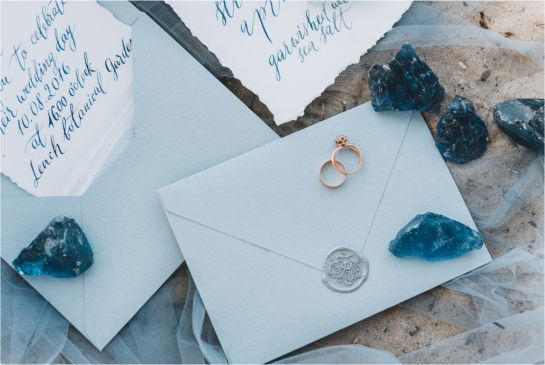
The words you choose for your wedding invitations go beyond conveying information; they set the stage for the celebration you plan. Proper invitation wording reflects your event’s tone, formality, and style. Here are some key points to consider:
- Tone: Are you hosting a formal, black-tie affair or a casual, laid-back garden wedding? The tone should match your event’s level of formality and the atmosphere you want to create.
- Hosts: Indicate who is hosting the wedding, whether it’s the couple, their parents, or a combination. This sets the stage for the invitation’s tone.
- Honorees: Mention those you wish to honour or acknowledge, such as parents or deceased loved ones.
- Date and Time: Ensure the date, time, and location are crystal clear to avoid confusion.
- Personalization: Your invitation should reflect your personality and style as a couple. Customize the wording to make it uniquely yours.
RSVP Cards
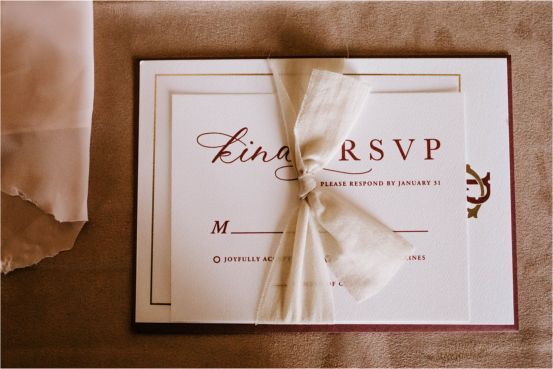
Though small, RSVP cards play a significant role in the wedding invitation ensemble. They are your secret weapon for managing your guest list and ensuring a smooth event. Here’s why they are so crucial:
- Confirmation: RSVP cards allow your guests to confirm their attendance. Knowing who will be present helps you plan seating arrangements and catering accordingly.
- Guest Count: An accurate headcount ensures you have enough seats, meals, and other essentials for your guests.
- Special Requests: Guests can use RSVP cards to communicate special dietary requests, song choices, or any other information they may need to make their experience enjoyable.
Handling Special Situations
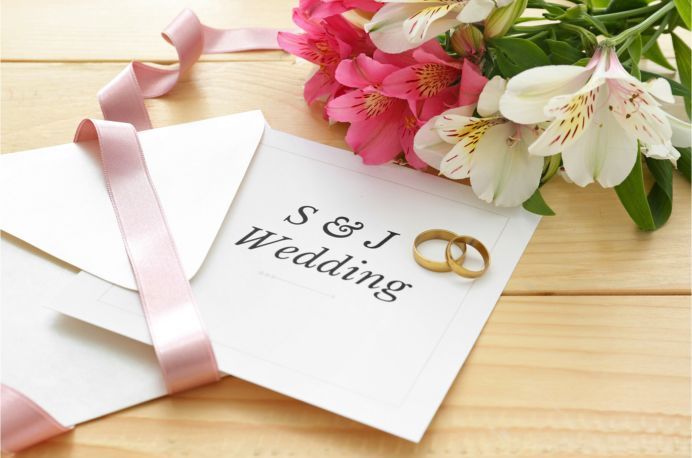
While planning your wedding, you’ll likely encounter various special situations and potential challenges related to your guest list. Let’s explore some common scenarios and discuss how to handle them with grace and etiquette.
Inviting Plus-Ones
- Define Your Plus-One Policy: Before sending out invitations, decide whether you’ll offer plus-ones to all guests or only to those in long-term relationships, engaged, or married. Be consistent to avoid misunderstandings.
- Clearly Address the Invitation: If you are inviting a specific plus-one, address the invitation to both individuals by name, making it evident that they are both welcome.
- Communicate Your Policy: If you’re not offering plus-ones to all guests, communicate this clearly on your wedding website or through direct conversations with those affected. Express your desire for an intimate event and apologize for any inconvenience.
- Consider Special Cases: For guests who may not fit your initial plus-one criteria but have specific needs (e.g., out-of-town guests who won’t know many people), evaluate their situations individually and make exceptions if necessary.
- Be Tactful: Approach this issue with empathy and understanding. Understand that some guests may be disappointed if they can’t bring a plus-one, and be prepared to handle their responses gracefully.
Children at the Wedding
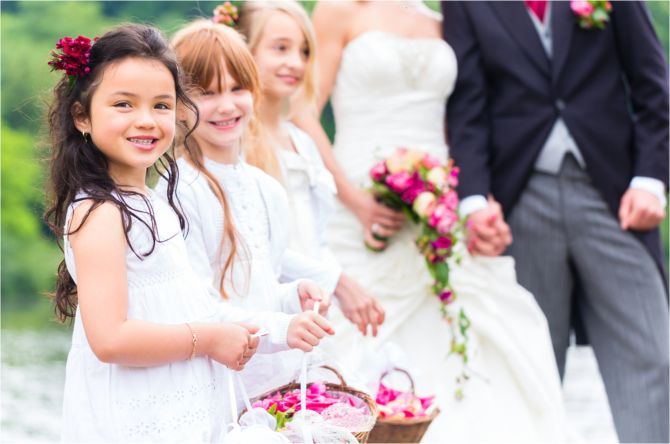
The decision of whether to include children at your wedding is a personal one. Here’s how to approach it thoughtfully:
- Be Explicit on the Invitation: If you’re hosting an adults-only affair, clearly state this on the invitation by addressing it to specific individuals or using wording like “Adult Reception” or “Adults-Only Celebration.”
- Communicate Your Decision: If you anticipate questions or concerns from guests with children, communicate your choice directly and politely. Explain your reasons, such as limited space or a more formal atmosphere.
- Offer Childcare Alternatives: To accommodate guests with children, consider arranging on-site childcare or providing recommendations for local babysitters or childcare facilities.
- Be Consistent: Apply your child’s attendance policy uniformly to all guests to avoid misunderstandings or hurt feelings.
- Respect Individual Circumstances: If some guests have infants or very young children and you decide to make exceptions, be mindful of their unique needs and consider making necessary accommodations.
Dealing with Declines
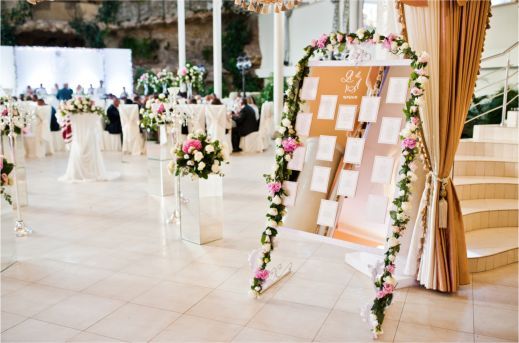
Not all guests can attend your wedding, and that’s perfectly normal. Here’s how to handle RSVP declines gracefully:
- Express Understanding: When you receive a decline, express your understanding and appreciation for their response. Tell them you’ll miss their presence, but understand that circumstances vary.
- Keep the Door Open: If your budget and venue allow, consider sending a thoughtful note or keepsake to those who declined as a gesture of appreciation and inclusion.
- Adjust Your Plans: If you receive more declines than expected, be prepared to adjust your plans, whether reconfiguring seating arrangements or adjusting catering orders.
- Stay Positive: Focus on the guests who will attend and the joy of your special day. Remember that everyone’s circumstances are different, and declines do not reflect your relationship with your guests.
Why Choose Tina Kristen Weddings for Your Wedding Makeup?
At Tina Kristen Weddings, we understand that your wedding day is a once-in-a-lifetime event, and every detail matters. Just as you’ve taken the time to perfect your wedding invitations, let us help you shine on your big day. Our team of skilled makeup artists is dedicated to enhancing your natural beauty, ensuring you look and feel your best as you walk down the aisle. Make your wedding day even more special by availing of our makeup services. Contact us today to schedule your bridal makeup consultation, and let us be a part of your beautiful journey forward.
FAQs
Q: Can we send digital invitations instead of physical ones?
While digital invitations are becoming more common, traditional physical invitations still hold a special charm. The choice between digital and physical invitations depends on your and your guests’ preferences. Keep in mind that some guests may appreciate the tangible nature of a physical invitation, while others might find digital invitations more convenient.
Q: How do we handle invitations for a destination wedding?
For destination weddings, sending out save-the-dates well in advance is essential to allow guests to make travel arrangements. Include detailed information about the destination, travel logistics, and accommodations. Be prepared to assist guests with local recommendations and any additional information they may need to plan their trip.
Q: Is it okay to invite some guests via email and others with physical invitations?
Consistency is key when it comes to invitations. To avoid confusion and ensure fairness, it’s best to choose one method for all your guests. If you must use different methods, communicate your reasons clearly and politely.
Q: What should we do if guests don’t RSVP?
It’s common for some guests to forget or delay their RSVPs. To encourage prompt responses, set a clear RSVP deadline and consider sending gentle reminders as the date approaches. Be prepared to follow up with non-responders directly to ensure you have an accurate guest count for your wedding day.
